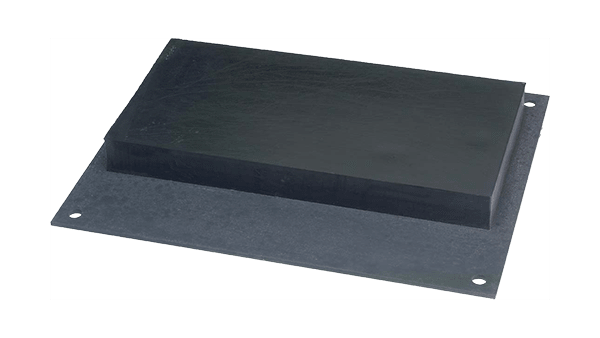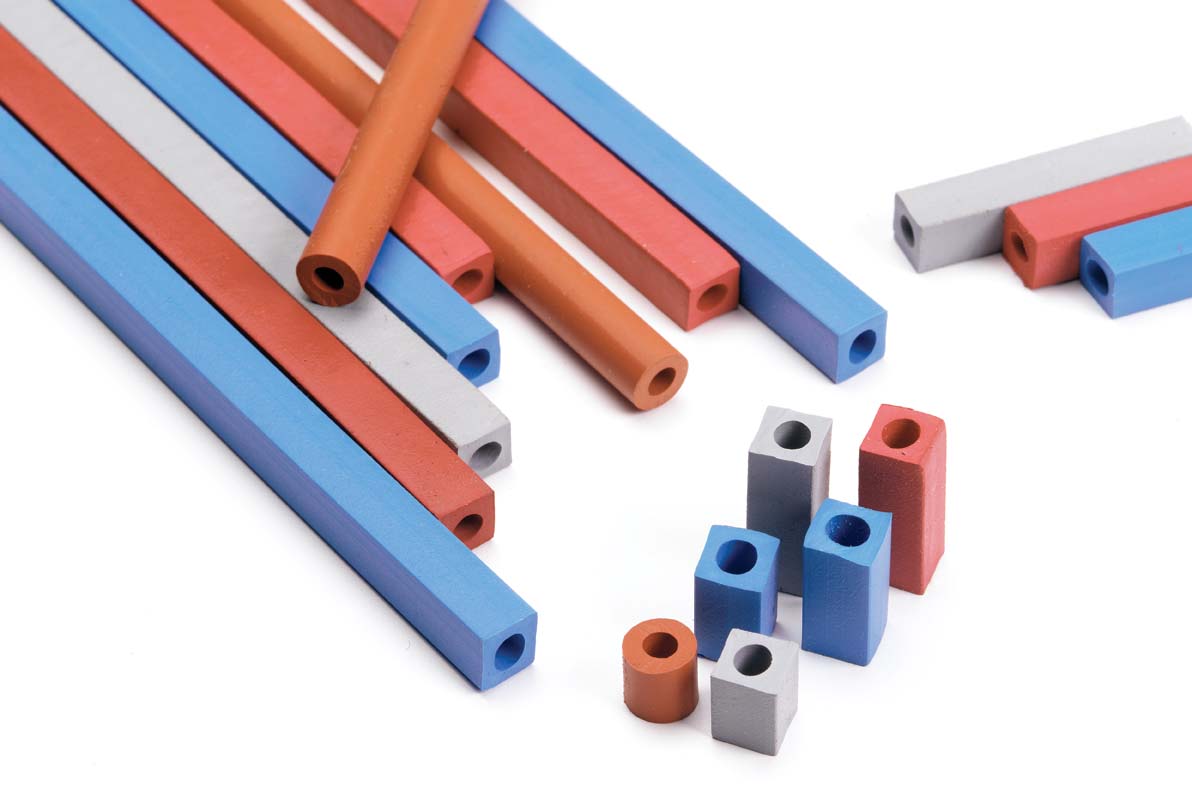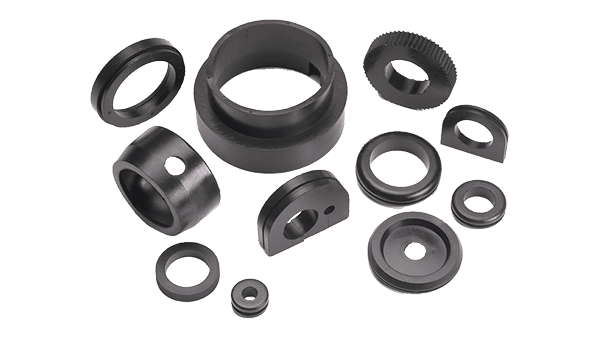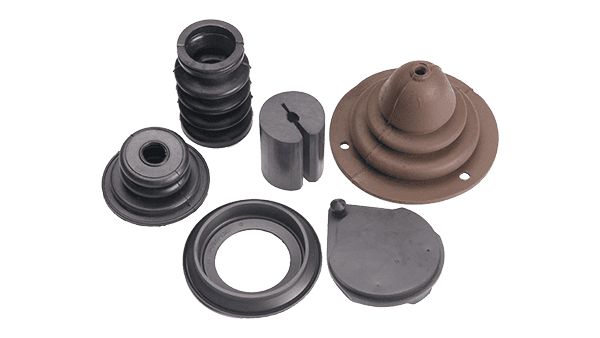
Synthetic Rubber Manufacturer & Supplier
Seals, O-Rings & Gaskets & More
Styrene Butadiene Rubber (SBR), or synthetic rubber, is a non-oil resistant, low-cost material that can be used in the production of several rubber products. It has properties similar to natural rubber, but with greater wear, water and abrasion resistance.

Natural rubber vs synthetic rubber
Compared to natural rubber, the advantages of synthetic rubber include its excellent abrasion resistance and ability to adhere to metals, making it a great option for rubber gaskets, seals and other products. Synthetic rubber also excels in extreme temperatures due to good heat resistance and heat-aging qualities. However, it is not recommended to use synthetic rubber in applications that involve ozone, strong acids, oils, greases, fats and most hydrocarbons.
What is synthetic rubber used for?
When you need a low-cost alternative to natural rubber, opt for synthetic. The synthetic material can be used in the production of several rubber applications, including:

Properties
- Common Name: SBR, Buna-S, GRS
- ASTM D-2000 Classification: AA, BA
- Chemical Definition: Styrene Butadiene
- General Characteristics
- Adhesion to Metals: Excellent
- Abrasion Resistance: Excellent
- Resistance
- Tear Resistance: Fair
- Solvent Resistance: Poor
- Oil Resistance: Poor
- Aging Weather/ Sunlight: Poor
- Temperature Range
- Low Temperature Usage to -50°F | -45°C
- High Temperature Usage Up to 225°F | 107°C
- Additional Properties
- Durometer Range (Shore A): 30-100
- Tensile Range (P.S.I): 500-3000
- Elongation (Max %): 600
- Compression Set Good
- Resilience - Rebound: Good

Applications
SBR rubber is also widely used in the following applications:
- SBR rubber pads (Mining equipment)
- Synthetic Rubber Seals
- Rubber gaskets
- SBR Panel grommets (HVAC market)
- Custom molded rubber components for plumbing applications

Benefits & Advantages
Additional advantages over natural rubber include:
- Low cost alternative material to Natural Rubber
- Has a variety of market applications
- Superior low temperature flexibility
- Very good heat resistance and heat-aging qualities
- Temperature range: -50°F to 225°F | -45°C to 107°C
- Shares similar abrasion resistance as natural rubber.
Synthetic Rubber FAQs
Q: What is synthetic rubber?
A: Synthetic rubber is a family of rubber materials made from the combination of styrene and butadiene. Unlike natural rubber, which is derived from rubber trees and other plants, synthetic rubber is typically produced from a polymerization process that provides the resulting compound with specific properties tailored to different applications.
Q: What are the primary characteristics of synthetic rubber?
A: Styrene butadiene is designed to have a combination of the following key properties:
- Excellent abrasion resistance.
- Outstanding adhesion to metals.
- Good ability to return to its original thickness following compression.
- A lower-cost alternative to natural rubber.
- Ample flexibility at lower temperatures.
Q: What are some common applications of synthetic rubber?
A: Butyl rubber is widely used in industries requiring airtight seals, protective barriers, and dampening. Common applications include:
- Industrial Manufacturing: Used for conveyor belts, rubber coatings, and vibration damping materials.
- Construction: Seals, gaskets, and expansion joints.
- Mining: Rubber pads and liners.
- HVAC: Panel grommets and seals.
- Consumer Goods: Used in items such as rubber bands, gloves, and hoses.
Q: How is synthetic rubber made?
A: Synthetic rubber is produced through the polymerization of monomers like styrene, butadiene, and isoprene. Monomers are linked together to form long polymer chains, which are then processed into raw material. The type of monomers and the polymerization process determine the final properties of synthetic rubber.
Q: What are the benefits of using synthetic rubber over natural rubber?
A: Synthetic rubber offers several advantages over natural rubber:
- Customization: Synthetic rubber can be formulated to achieve specific properties like improved oil resistance, temperature resistance, and durability.
- Availability: It is available in large quantities and is not dependent on natural resources like rubber trees.
- Cost-Effectiveness: Often more economical to produce, particularly for high-demand applications.
- Consistency: Synthetic rubber can be produced with more consistent quality compared to natural rubber, which can vary depending on harvest conditions.
Q: What are the limitations of synthetic rubber?
A: While synthetic rubber is versatile, it does have some limitations:
- Environmental Impact: The production of synthetic rubber relies on petroleum-based chemicals instead of naturally occurring plants, contributing to its carbon footprint.
- Biodegradability: Many types of synthetic rubber are not biodegradable, leading to disposal challenges.
- Cost of Specific Grades: Some specialized synthetic rubbers, such as those used in aerospace or high-performance automotive applications, can be more expensive than other rubber material options.
Q: What are common processing methods for Synthetic Rubber?
A: The main processing methods for Synthetic Rubber include:
- Extrusion: Used to create continuous shapes like seals, gaskets, and tubing.
- Molding: Allows for the production of complex shapes and custom parts, including automotive components and industrial seals.
- Calendering: This method is used to produce thin sheets and films, often for insulation or coating applications.
- Vulcanization: A heat-based curing process that strengthens rubber, improving its elasticity, durability, and resistance to wear
Interested in synthetic rubber for your application?
Get a quote, contact us, or call 1-888-754-5136 to find out more.
Not sure which material you need for your custom rubber product? View our rubber material selection guide.
Want to make sure that Timco is the right partner for all your synthetic rubber part requirements?